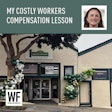

Managing cash flow is one of the most important tasks faced by any wood flooring business owner. When done successfully, owners may find themselves with a good "problem" — excess cash in the business checking account. The challenge is to manage this excess cash to reap the highest return while still maintaining the liquidity necessary to meet daily working capital expenses.
There are several options available to help you put excess company cash to work. But before you consider them, you first must determine your timeframe for investing the money, because while earning a decent return on excess cash is certainly a goal, ensuring adequate liquidity of business funds to meet day-to-day business expenses should be the priority.
"Liquidity is one of the most important things a business owner needs to pay attention to," says Brad Hendry, a former federal bank examiner and now the president and CEO of Community Capital Bank in Jonesboro, Ga. "Businesses must keep an acceptable level of funds in their day-to-day business checking account, and it's also smart to have a source of backup funds available, like a revolving line of credit."
What exactly is an acceptable level of liquid business funds? Hendry says this varies widely depending on your type of business and your industry. Also pay special attention to your business' cash-flow cycle, because what appears to be excess cash might not always be so. For example, if you've collected payment for a large job up front but still have to pay for materials and other cost of goods sold (COGS) in the future, any excess cash position in your checking account is only temporary. These kinds of "excess" funds should just stay parked in your checking account or, if your COGS won't be due for a month or longer, perhaps in an ultra short-term investment.
Weigh Your Options
When it comes to investigating the various investment options available, your bank is a good place to start, says Tim Chapman, principal and co-founder of Athens, Ga.-based Personal Mutual Fund Management. "Most major banks offer a wide variety of investment options, including money market deposit accounts and mutual funds, sweep accounts and certificates of deposit (CDs)," Chapman says. "Bank investment accounts typically offer FDIC-insured savings with market interest rates and full liquidity, while sweep accounts automatically move excess money from a non-interestbearing checking account into an interestbearing savings account."
For most small businesses that want to make sure their money is always working hardest for them, a sweep account is a great solution since money is swept into short-term investments automatically. "Just remember that while you can sweep money into the investment account as often as you like, there's a limit to how often you can sweep money out," says Hendry. "So be sure to set your target checking account balance high enough to cover 90 to 95 percent of your business' working capital needs."
Time on Your Side
Aside from an automatic sweep account, if you have excess funds with at least a three-to-six-month timeframe, Chapman says to consider bank CDs. "You'll earn a little more than a regular money market or interest-bearing account in exchange for giving up some liquidity by agreeing to leave your money there for a specified length of time," he says. Some banks offer business CDs with slightly higher interest rates, but generally speaking, the more money you invest and the longer you invest it for, the higher interest you'll earn.
CDs of $100,000 or more are known as "jumbo CDs." If purchasing a CD larger than this, Hendry says to remember that balances over $100,000 are not FDIC-insured, and that the $100,000 limit applies to all combined funds invested or on deposit with a single bank.
Moving out on the time horizon, Chapman says that shortterm U.S. Treasury bonds and bond funds are an option if you have a two-to-three-year timeframe. But remember the inverse relationship between interest rates and bond prices: "As interest rates rise, bond prices fall," Chapman explains. "This doesn't mean anything if you hold the bond until maturity and receive the face value. But if you have to liquidate it early, you could take a loss, even on an AAA-rated government bond. For example, if you have a 30-year government bond and interest rates rise two percentage points, the value of the bond declines by 17 percent."
Short-term bond funds invest in a portfolio of short-term bonds and commercial paper, Chapman says. "Often, the yield is higher because the credit ratings of the holdings in the portfolio are lower than the typical money market. This, of course, also means more risk; however, much of that risk is negated by the short duration of the notes. There are many outstanding funds in this category that may fit the bill for a company's short-term excess cash."
Long-Haul Investing
What about stocks? As the past couple of years have made painfully clear, the uncertainty and volatility of the stock market is too great for true short-term cash. Even with a timeframe of up to three years, stocks can be a risky bet. Historically, the average bear market lasts about 18 months, and it takes more than three-and-a-half years to recover the losses.
However, this doesn't mean equities aren't an option for business investments. If you do have a few years and would like to have some money invested in the stock market, one alternative is to use an actively managed account. "With these accounts, money managers use a technical analysis approach to reduce volatility and preserve principal," Chapman explains. "By maintaining a balance between safety and return, principal is preserved so that withdrawals can be made if needed. However, there is some short-term volatility, so this approach still doesn't make sense for money that will be needed in the next six to 12 months."
Chapman notes another way to look at it: Since much of the excess cash generated by a closely held business will eventually belong to the owner, then the owner should look to make the most of it for his or her personal benefit, as long as the cash isn't going to be invested in the growth of the business. "In this case, the owner should ask, 'If the money were in my personal checking account, how would I invest it?' And despite a couple of tough years, stocks have historically been the best-performing investment over the long term," he says.
If your cash flow is fairly steady and predictable, Chapman recommends taking advantage of dollar-cost averaging in order to make regular, systematic investments into a welldiversified mutual fund portfolio. With dollar-cost averaging, you invest a set amount of money each month. You actually benefit when the market is down, because your money buys more shares at lower prices.
Don't forget retirement planning—consider starting and funding a retirement plan with your excess business funds. "Small business owners should seriously consider opening a SEP-IRA or some other type of qualified retirement plan to get the tax benefits and start saving for retirement," Chapman urges. "For excess cash that isn't going to be reinvested in the business and is long term, this is a much better strategy than just parking it in a mutual fund."
There are many different options and strategies when it comes to managing and investing excess business cash. Consult with your accountant to determine how much you may have to invest and for how long, and then with your banker and/or investment advisor to determine the best strategies for getting your money to work for your business.






























